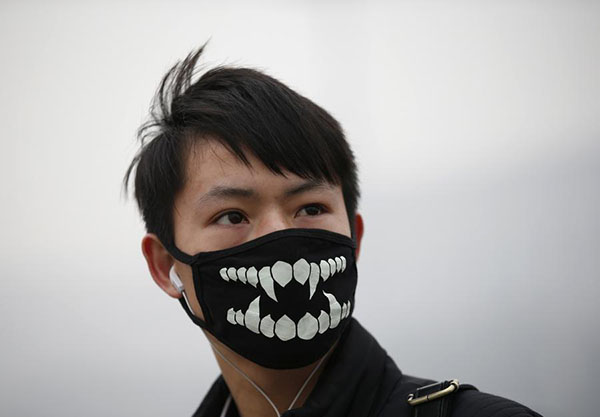 |
|
A man wearing a mask makes his way during a polluted day at Tiananmen Square in Beijing January 15, 2015. Beijing issued its first smog alert of 2015 on Tuesday. [Photo/Agencies] |
Capital's performance on reducing PM2.5 concentration fell short of target last year
|
Polluting companies face shutdown Polluting companies in Beijing will not be allowed to relocate in neighboring areas of Hebei and Tianjin, but will be shut down immediately, said the capital's mayor. "Environmental protection has been a priority in the regional integration of the Beijing, Hebei and Tianjin areas," said Wang Anshun, mayor of Beijing, at a forum focusing on cooperation in the trilateral zone in 2015 on Sunday. The three areas need to work as a whole so that the improvement of Hebei and Tianjin will fuel the growth of Beijing, and polluting companies in Beijing cannot move to the two areas, Wang said. "Not because the two don't want them, but because we cannot think in this way," he said at the forum of Beijing Political Consultative Conference, adding that the capital's polluting companies will be shut down once they are identified. Coordination among Beijing, Hebei and Tianjin was promoted in 2014 and many companies relocated from the capital to the two neighbors since further development of these companies was not in accord with the functions of the capital. For example, several large markets selling clothes and household appliances will move to Hebei and a new biomedical industry park will locate in Cangzhou, Hebei province. Beijing will release a list containing industries that the three areas can cooperate on with regard to development, based on the municipal government Work Report, which was announced by the mayor on Friday. In addition to industrial cooperation among the three, another two areas-the transport system and environmental protection-will be major tasks of the Beijing municipal government in 2015, with breakthroughs being achieved, the mayor said. The report detailed several projects in the coming integration, including a unified travelers card. |
The punishments levied for environmental violations amounted to more than 100 million yuan ($16.1 million) in Beijing last year, the city government said during the annual session of the Municipal People's Congress.
Since an action plan to control air pollution was issued by the government on March 1, fines for environmental violations reached 105 million yuan by the end of last year, three times more than in 2013, according to a report by the municipal government.
It is the first time that fines for pollution violations have exceeded 100 million yuan in the city, reflecting the government's determination to prevent air pollution and punish violators.
But despite the crackdown on polluters and a determination to improve air quality, the city's performance last year did not meet expectations.
At the beginning of 2014, the government said it would achieve a 5 percent reduction in the concentration of PM2.5-airborne particles smaller than 2.5 microns in diameter that can penetrate the lungs and harm the health-but it only managed a reduction of 4 percent by the end of the year.
The PM2.5 reduction target is difficult to achieve, said Chen Tian, director of the Beijing Environmental Protection Bureau.
In many foreign cities, the annual reduction in concentration of PM2.5 was around 1 to 2 percent.
Beijing has witnessed an annual reduction of 2 to 3 percent in the past decade, Chen said.
The reduction in the concentration of this major airborne pollutant does not directly follow the reduction of air pollutant emission but has a close relationship with weather conditions, he said in an interview with Beijing News.
Every percentage reduction of PM2.5 concentration requires huge amounts of reduction in air pollutant emission, he said.
"So the goal in 2015, a 5 percent reduction in the concentration of PM2.5, is more difficult to reach, yet we will also try harder," Chen said.
Along with the stricter punishment of polluters, Beijing will consider levying a new fee on traffic congestion based on research by the Environmental Protection and Traffic bureaus. But when such charges will be introduced has not been decided.
Though the capital overall missed the goal of cutting the average concentration of PM2.5 by 5 percent last year, Chaoyang district made it, "through strict control of the consumption of coal and the upgrade of boilers", said Cheng Lianyuan, Party chief of the district and also the deputy of Beijing's top legislature.
"The goal is only a result, but more important are the effective efforts we have taken to realize it," he said.
During the discussion about the implementation of the action plan on controlling air pollution, some deputies suggested that the municipal government take emergency measures during times of increased air pollution.
Guo Jifu, director of the Beijing Transportation Research Center and also deputy of the top municipal legislature, said the government should take strict measures based on the action plan, including restrictions on the use of vehicles based on an odd-even license plate system and suspension of production by companies in polluting industries.
"The government needs stronger determination on implementing the restrictions to reduce air pollution," he said.
Contact the writer at caoyin@chinadaily.com.cn
